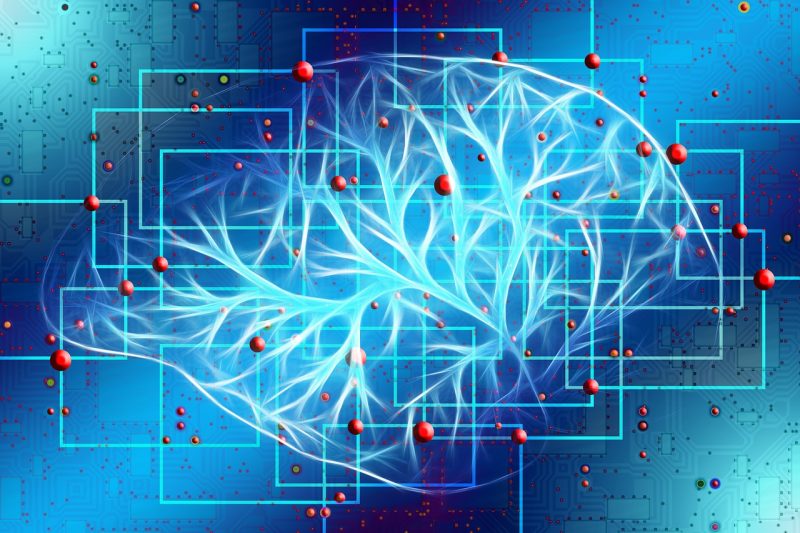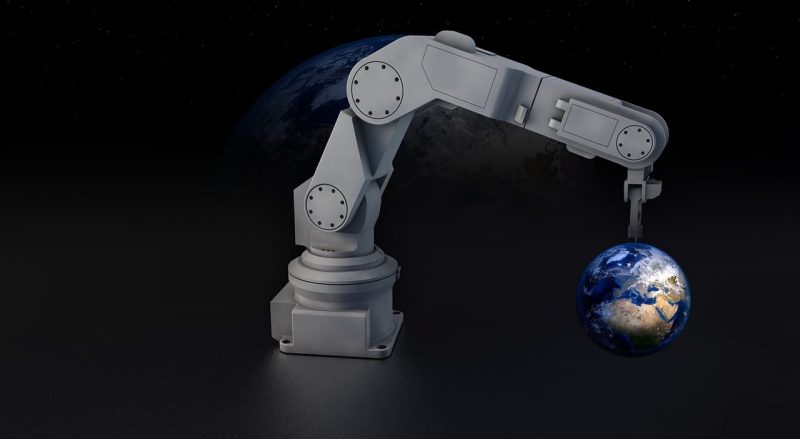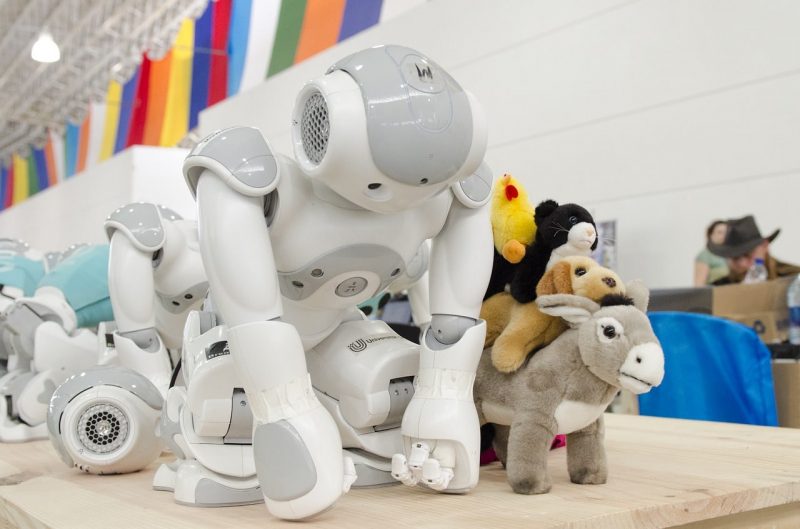Hello everyone, everything good? This article will address a much discussed subject in the technology field, Artificial Intelligence. Abbreviated as AI, it is the utopia for most scholars in the fields of technology, electronics, engineering, computer science and many other areas related to robotics and computing. This is due to the fact that it is a huge challenge but that always presents advances, unlike other researches that generate irrelevant results or do not present results at all.
The nature of the scientist is the same as that of any curious person. And as such, it gets excited when it discovers that there is a secret, and it increases the more progress it makes in its investigation. AI in today's world is not reality. There are intelligent robots that are pre-programmed to perform functions, but as we will see in this article, AI means something else.
The article is very complete, and in the end, we also recommend some for you to delve deeper into the subject if you wish.
AI or AI - Software
Artificial Intelligence (AI) or Intelligent Artificial are terms used to refer to “intelligent machines”. In order not to leave this definition vague, we can explain it, however there will not be many other simple ways to describe AI. More specifically AI means machines that have the Intelligence to respond to stimuli from the environment in which it finds itself, in a way that maximizes its chance of success in any action it takes.
The mechanical part of the robotics machine is not mandatory to be called AI. Because what is important is the software that controls the machine, this part is the intelligence itself. Software is a computer program, in basic, layman's terms. However this is just a vague term, software is a set of "keys" and "locks" in the form of sets of algorithms that communicate with each other, making and redoing thousands of calculations per second, with each lock responding accordingly. with the key that activates it.
It is complicated and counterproductive to fully explain things like this, however this explanation will be of great help later on as it is the term that fully defines the thing called “Artificial Intelligence”.
The meaning of intelligence
If we are going to research the meaning of intelligence, we will find something like “ability to learn or ability to solve problems and adapt to situations”. Reflecting on this, it can be seen that this is a vague term and has no absolute application.
Intelligence does not have a global and interpersonal level, everyone can learn things in different ways, and can solve problems in different ways. There is no absolute opinion about which attitude is smart, there is only a general census, that is, the opinion of the majority about some situation.
There is also the fact that Intelligence is relative from person to person according to the experience accumulated by each one. And the common census has great weight in learning and the accumulation of experiences and, with that, in intelligence. To explain better we will put an example below.

Example of intelligence in the general census
There is a robbery in progress, the place is a small coffee shop with a relatively large number of customers. We will not quote a date, we will just imagine that there is a humanoid robot with artificial intelligence, this robot is programmed to react to situations like these in the way that it has a chance to be in the best possible way, it also has it equipped with a lethal weapon and stun gun, in addition to a truncheon. He also already has experience with these situations and in all of them he had the solution without harming any human being.
However, on this occasion, the assailant takes a woman hostage for himself, and protects himself from the robot's sights. This occasion is also programmed and trained by the robot's AI software but was never used because it was not necessary. Robot weapons have the following specifications.
The lethal weapon has great piercing power, the tranquilizer weapon The solution would be to use the stun weapon has little capacity, just enough to kill a human being. The robot's software, with the intelligence contained in it, was able to learn that robbers have a high possibility of becoming murderers, and protecting the population also means preventing crime and not just reacting after it happens. And because of that knowledge letting the assailant escape would be unthinkable for the robot.
In this situation the robot could not use the stun gun because in all situations it would give the assailant an escape. So he decides based on the stat readings that sacrificing the hostage would be the “Smartest” thing to do.
As this is the general census, most I believe will support this action, however the other party will not agree and would call this attitude “barbaric” and take other actions. Wouldn't these other opinions be indirectly calling the robot's action "stupid"? Draw your own conclusions.
The article is still halfway through, but we recommend also reading:
Artificial Intelligence as an academic branch
In order not to vary the definition too much, we will select some paragraphs containing another meaning of the term AI. I believe that the meaning of this one will not affect the previous one, as it relates to other facts, but it will also vary since AI is an extremely vague concept, as we can confirm in the previous topics.
But before that, we have to make clear the fact that AI refers to and is contained in computer science primarily. Robotics or other fields are only secondarily involved. Because it is a subject of academic research, it has an academic branch especially for it.
And this branch is defined as the branch of computer science in general dedicated to research and creation of computational means and devices, which are capable of possessing and even multiplying the rational capacity of humans, that is, capable of having “intelligence”. With an emphasis on the part of being able to multiply human intelligence.

Artificial Intelligence and its variants
If we are going to research AI, we will see several types of them. Well, they will be able to react and perform to situations, however they are just pre-programmed software. And their reactions are based on what is in the software, that is, each stimulus from the environment is the key that will open a lock, which is the robot's reaction.
Yes, these actions will be considered intelligent, but programmed reactions are not enough. Intelligence is also the ability to learn, that is, despite performing intelligent actions these robots would not qualify as a model of artificial intelligence.
This is a kind of intelligence, but it's nowhere near what scientists expect. Utopia for them would be a type of intelligence that is capable of learning continuously, always according to the success rate taken into account.
Utopian Artificial Intelligence
If we were to compare these two types, we would have the following, the first one in its programmed area of expertise would take the right actions, however it would not work if placed in another type of situation, such as a police robot, it would know deal with crimes but wouldn't know how to do housework.
The second type would be the perfect model for all types of situations, as the ability to learn and react to stimuli would be enough for him to adapt perfectly to any type of situation. But of course, just like the human brain, this AI would need information about what to do, for that we have the internet, which would make available and share all kinds of possible situations.
But if we didn't have the internet, AI would need trial and error experience. This means that he would need to experiment with various methods to arrive at the ideal method. You can already see that this AI greatly imitates the human brain, this is because the utopian intelligence for scientists is exactly one that imitates our brain.
Strong Artificial Intelligence
AIs can thus be divided into two different parts on some issues. The first is strong AI and the other is weak AI. For better understanding I believe to take into account the previous examples for this topic as well.
Strong AIs are software that can learn continuously, as I mentioned before, this is the utopia for scientists in this field. Strong AI is capable of doing everything we do with our brains, from learning simple things to solving difficult problems. In addition, she will never stop learning, unlike the human being who decreases this ability with time.
In this regard, strong AIs could learn all the things they had access to, and with the internet as a medium, they would be able to take possession of all the knowledge existing on the network. This is the main topic of discussion about Ias. But of course this is so far unthinkable.
For that to happen, the software would need an unimaginable amount of memory, because everything has a limit, just like our brain. This AI is also involved in discussions about ethics, as it is classified as self-conscious, and would and would come to have personality and feelings. The latter is just speculation, after all it has no basis, since not even human beings know exactly what feelings are.

Weak Artificial Intelligence
Well this one is easier to explain. The fact is that weak ones are those who can necessarily reason and solve problems. They are those machines that are programmed with keys and locks already arranged for it. That is, it only reacts based on what it has programmed and cannot deal with situations that are beyond its scope.
If we are going to compare this type of AI with the one from the previous topic, we can use the example of keys and locks. Weak AI would have a limited number of them, never being able to increase that number. Even if the number is gigantic, it will always be limited.
This limiting factor does not exist for strong AI, as with its ability it is able to “create” new keys and locks whenever it wants. Whenever she comes across a new lock, the strong AI will create a new key. And she would also keep information continuously, always searching, researching and selecting the best keys for the current locks and the ones she will find.
A little history of Artificial Intelligence
Although this topic is much discussed today, the concept of AI is not new. Aristotle, the great philosopher, aimed to replace slave labor with autonomous objects. So, this is the first known artificial intelligence idea. The development of this idea took place fully in the 20th century, with a focus mainly on the middle of the century. In a limited way, the early years were full of achievements.
The fact that a computer could perform any remotely intelligent activity was a big surprise, because before computers were machines that did arithmetic calculations and nothing more. From the beginning, AI has relied on various ideas, points of view, and even techniques from different disciplines to form the basis of this science.
Philosophers contributed by making the idea possible, considering the ideas that the human mind resembles a machine in some ways. Economists created the problem of making decisions to increase the expected result. Psychologists have accepted the idea that we can be information-processing machines, and even animals are included in this regard. linguists have shown that language use fits this model. Computer engineers make AI applications possible by providing the necessary materials.
Artificial Intelligence and the future
The AI topic is extremely confusing and divergent, researchers do not agree with each other and often fierce discussions are raised on the topic. Several questions are thrown to question the use and danger of AI. At the same intensity, responses are returned with the aim of defending all the advances and facilities that AI can provide. But they never come to an agreement, and it is like an anthill, several paths that lead somewhere and so many others that only serve for us to deviate from the right route.
But currently there are practices and techniques derived from this science that have proven use and efficiency. Among them we can highlight the following
- Autonomous control: when software is trained and packaged to be able to steer a vehicle;
- Diagnosis: software capable of performing diagnosis at the level of a specialist in several areas;
- Logistic planning: software capable of planning things such as cargo transport according to the best logic, taking into account extreme situations such as conflicts and disruptions on the route;
- Robotics in medicine: robots used as assistants to surgeons in microsurgeries.
- Chatterbots: software capable of interacting through conversations in a natural language as if they were really human;
Advantages of using Artificial Intelligence
Decrease errors: Being machines, artificial intelligence is more resistant and has a greater ability to withstand hostile environments, decreasing the chances of failing in its objective. And it may be possible to achieve a greater degree of precision.
Exploration: Because of the robots' programming, they can perform more demanding work with greater responsibility. Thus, they are able to perform tasks that overcome human limitations, such as exploring the ocean floor or exploring inhospitable and dangerous mines.
Daily Applications: Artificial Intelligence is present in several mechanisms of our daily lives such as GPS (global positioning system), correction of spelling errors in typing, among others.
No breaks: Machines don't need frequent breaks, unlike humans. They are able to work continuously without getting tired, distracted or bored, just by their schedule.

Disadvantages of using Artificial Intelligence
High cost: the production cost of AI machines are gigantic, because of the complexity and difficulty of maintenance. The process of recovering lost codes, for example, requires a lot of time and resources.
Lack of creativity: Artificial intelligence is not developed to the point of acting like the human brain, in a creative way. Therefore, the idea of performing functions equal to the human brain is inaccessible. This is also due to the fact that the brain is not fully understood and therefore cannot be replicated.
Mass unemployment. As they are able to perform tasks previously exclusive to humans in a more optimized and efficient way, artificial intelligence engines tend to replace human activity on a large scale. Since the work of AIs would be far better and more productive, this would cause the imminent replacement of as many people as possible by these machines.
Artificial Intelligence Researchers
There are currently several AI researchers around the world at various research institutions and companies. Among the many who made significant contributions, we can mention the following, it is worth remembering that this is just a reference to the importance of these names. To find out more about them, I recommend a deeper search.
- Alan Turing (1912-1954): He was one of the most important men of all time. With studies that were not only the basis for the existence of artificial intelligence, but for almost all electronic devices ever made;
- Jon McCarthy (1927-2011): Mathematician, scientist, the creator of the term "artificial intelligence" and also the father of the LISP programming language;
- Marvin Minsky (1927-2016): The scientist explored ways to endow machines with perception and intelligence similar to humans, created robotic hands capable of manipulating objects, developed new programming milestones, and wrote about philosophical subjects related to artificial intelligence.
Artificial intelligence in the economy
Currently AI is one of the main research topics, as its advances and discoveries are extremely profitable and continuous. That is, even if only one step forward is taken, this step in itself already compensates for all the efforts invested in it and still encourages and gives confidence to continue researching.
With features like these and applications in all types and levels of industry, from agricultural machinery to space travel programming computers, its market is gigantic, and it grows exponentially right after a new discovery.
There are many estimates about the size of the artificial intelligence market. According to Bank of America Merrill Lynch, the global market for artificial intelligence solutions will grow to US $ 70 billion in 2020 from US $ 8.2 billion in 2013. The global AI market is also expected to be increasingly affected by growing government funding and strong technology base.
Artificial Intelligence Markets
There are several large AI markets, such as the US, Japan, Europe and recently China. Deep learning, which aims to try to copy the functioning of the layers of neurons in the human brain, is a breakthrough in the 50-year history of AI.
Tractica, a US market research firm, predicts annual software for enterprise deep learning applications will reach US$$ 11.1 billion in 2024.
According to Frost & Sullivan, it is estimated that AI revenues in healthcare will reach $6.66 billion in 2021, up from $633.8 million in 2014. Strategy Analytics, an American research and consulting firm, predicts that autonomous driver-assisted systems will grow from 5 billion euros in 2012 to 16 billion euros in 2019.
Rules of research on Artificial Intelligence
There are currently no rules or regulations placed on AI research. It is up to each company to decide what will and what will not be researched. And as we can deduce, companies do everything in their power to generate profit. Which often leads to reprehensible but productive actions.
It is for reasons like this that there is a recurring need to sanction rules and standards for AI research. Based on this line of thinking, Japan proposed the creation of a set of ground rules for the development of AI technology at the G7 technology meeting in Japan in April 2016. One rule that was given as an example in this proposal would be to make the AI networks controllable by humans.
Japanese Artificial Intelligence Industry
As the focus of the site is Japan, we could not talk about it in this article. Since it is also one of the biggest AI markets in the world, it will be discussed particularly here. But just for the record, what I will put are only light and medium information, if you are interested and want to know more about this topic I will leave the links of the sites where I took the base of this article
Many analysts have pointed out that the Japanese AI industry today is not very competitive on a global scale. For example, when it comes to AI research between 2008 and 2013, most come from Western countries and China. Only about 2% come from Japan. Which is an extremely low number for a large country like Japan.
Over the past 10 to 20 years, Japan has lost its technology lead to companies in the West, and largely due to software deficiencies. Japan is still at the forefront of hardware such as robots. But this stronghold is in danger of being lost, because software is increasingly vital to making these products work and competing in the international market.
japanese artificial intelligence
When it comes to deep learning, it is currently the most advanced form of AI. There is a big difference between Japan and the US. In Silicon Valley, deep learning is primarily a way to make software better. However, many Japanese companies tend to look at deep learning differently, as a way to improve hardware.
Deep Learning is a subfield of Machine Learning that investigates techniques to simulate the behavior of the human brain in tasks such as visual recognition, speech recognition and natural language processing. Deep learning algorithms aim to produce high-level hierarchical representations of input data, through sequential processing layers in an artificial neural network.
Deep AI learning - part 1
I can't choose terms, but I can give an example, for people who couldn't understand. We will return to keys and locks, well the brain works more or less as follows, a stimulus from the environment acts like the keys, the reactions act like locks, for each type of stimulus the brain creates several different keys that are selected different from people to people.
Often there are locks after locks, in various sequences that function more like memory devices, and they need keys to open, and when there are no keys, the brain creates them (this situation is what I call new experiences) even other than the best, it will remember this lock and on other occasions it will try to create other keys to open this lock (so called trial and error for us).
Deep AI learning - part 2
Well if I managed to explain it right, you must have understood that the brain is not like a room with several doors that lead directly to different exits, it would look like a room with numerous doors, and these doors would lead to other rooms with several other doors. just like the initial one, and if you entered another door of this second room, you would end up in another room full of doors just like the previous ones, this phenomenon would end when the brain reached the desired result.
To explain in numbers, we can do the following. Imagine that the brain stores information as numbers 1 to 4. It records a particular situation as the number 3321. If it demanded to redo this situation at another time, it would have to trace the same number path.
We went back to the doors, if the doors of the rooms were numbered with a number each, you would need to use the keys to open the locks of the numbers in the respective order, always remembering that there could be the case that you could achieve this feat with more than one key for each lock.
Helpers of the AI Industry in Japan
For a long time, Japanese companies focused on robot (hardware) manufacturing, while foreign companies focused more on the software side. Japanese manufacturers need to implement a more customer-oriented perspective to develop AI robots that better match users' needs. The government's goal is to spark a robotics revolution with robots equipped with artificial intelligence that can communicate with each other.
In May 2016, a Cabinet Council on Industrial Competitiveness announced that it would begin introducing AI-enabled systems in a variety of industries and areas, which should increase Japan's productivity. The goal is to increase GDP to 600 trillion yen in 2020 from the level of around 500 trillion yen in 2015. A sub-goal is to create a 30 trillion yen market for new emerging technologies, including other technologies of AI
Other Helpers of the AI Industry in Japan
Another development that over time will cause the AI market to expand is the trend of Japanese corporations establishing AI research and development bases in the USA. R&D centers in institutes Japanese public research centers have also been established, and this is expected to accelerate new advances in AI technology.
The declining population will begin to harm the job market as the population continues to age and its birth rate does not increase. Statistics show that people aged 65 and over accounted for 26% of the population in 2015. Japan plans to make up for the shortfall in the working population with widespread use of AI-powered robots.
Challenges for Japanese Artificial Intelligence
The Nomura Research Institute has tried to quantify the potential impact of artificial intelligence on the labor market and indicated that there is a possibility that around half of Japan's workforce will be replaced by robots or artificial intelligence in the next 10 to 20 years.
It will be important to steer the explosive growth of AI in the right direction to reach the full value of AI's possibilities. In this regard, it will be important to closely monitor developments abroad. There are many privacy, security, regulatory and legal considerations that need to be taken into account when integrating AI technology into private sector activities.
The need to develop new business models to deal with the new realities of technologies emerging AI is also an important issue. And several other specific types of challenges will need to be addressed if Japan is to grow and compete on an equal footing with the other major AI markets around the world.
Japanese domestic artificial intelligence market
Artificial intelligence is increasingly entering a commercialization phase in Japan. According to the Japanese government, AI technologies are expected to generate an economic return of around JPY 121 trillion by 2045.
According to a study by the Ernst & Young Institute, a Japanese research center, it is estimated that the size of the AI market will grow from approximately 3.7 trillion yen in 2015 to 23 trillion yen in 2020, a six-fold increase. And by 2030, the market size will reach around JPY 87 trillion.
The transport sector, including driverless taxis and trucks, will see the biggest increase during the forecast period and is estimated to reach 30.5 billion yen by 2030. The manufacturing sector, which includes automobiles self-employed, is expected to grow to approximately JPY 12.2 trillion by 2030.
Artificial Intelligence courses
Below we will share some interesting online courses on Artificial Intelligence:
Books on Artificial Intelligence
Below we will share some interesting books on Artificial Intelligence:
Conclusion on Artificial Intelligence
Finally, I have to stress again that AI is an extremely complex subject that involves material of various types, from philosophy to engineering. To simplify understanding and improve the flow of the text, I have sacrificed some details that could become important in other cases. But in this article the main focus was to talk and try to define what AI is and why it is important.
For me, who did a lot of research and saw a lot of content, selecting and highlighting the main ones, this text has numerous flaws, but for people who are just trying to kill a little curiosity about AI, this is a text, in my opinion, satisfactory. I also tried not to include acronyms about AI, as acronyms often need separate explanations to be understood, as was the case with DL, or deep learning.
In addition, I can only indicate some sites with content about AI, which were the basis for this article.
- https://medium.com/neuromation-io-blog/artificial-intelligence-in-japan-r-d-market-and-industry-analysis-e086a38639ec
- https://pt.m.wikipedia.org/wiki/Inteligência_artificial
This article ends here. Thank you, my dear reader, for reading this article this far. And if you have any questions, suggestions, criticisms or any other type, please comment below. And don't forget to vote, it helps us to offer you the best content.






